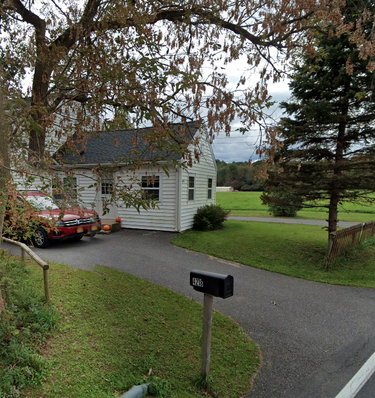State bill to register and tax short-term rentals awaits gov’s signature
— Photo from Google Street View
The owner of this house at 4218 Becker Rd. was found in violation of town code for renting it out through Airbnb, causing Guilderland to draft a law to allow for short-term rentals. The town board postponed adopting the law, waiting to see if the state would legislate the matter.
GUILDERLAND — In March, the town board here put off adopting a law on short-term rentals while it waited to see if the state would step in.
On Monday, Assemblywoman Patricia Fahy and Senator Michelle Hinchey announced their bill (A4130C/S885C) to create the state’s first Short-Term Rental Registry is on its way to the governor’s desk following its bipartisan passage in both the Senate and Assembly on the last day of the legislative session.
“Short-term rentals play an important role in New York’s tourism economy, helping homeowners generate extra income and often serving as the sole visitor lodging option in rural areas,” said a joint release from Fahy and Hinchey, both Democrats.
“The exponential growth of this billion-dollar industry, however, has exacerbated the housing crisis by reducing housing availability, driving up costs, and displacing long-term residents,” the release said.
The bill would establish basic safety standards for short-term rentals and also require property owners to register their short-term rentals with the state’s Department of State every two years. Based on that information, the department would send monthly reports to municipalities with details on the number of rentals in their community, their locations, and occupancy nights.
“This legislation levels the playing field for hotels and motels by collecting sales and occupancy tax on short-term rentals, addressing an estimated $550 million in lost local revenue over the past five years,” said the bill’s sponsors.
Guilderland’s supervisor, Peter Barber, a lawyer, drafted a bill in March to allow short-term rentals in town after Guilderland’s zoning board last November had sided with the town’s code-enforcement officer about an Airbnb on Becker Road, finding it in violation of town code.
Guilderland’s five-page bill would require the owner of a short-term rental unit to fill out an application and pay an annual fee.
The bill also lays out a long list of safety regulations that must be followed such as smoke and carbon-monoxide detectors, fire extinguishers, operational doors, bedrooms — with no more than two occupants — having emergency exits, serviceable electrical and mechanical systems, vented fireplaces, off-street parking for one vehicle per bedroom, and weekly garbage disposal.
A property is not to be rented for more than 240 days per year unless “the short-term rental property or an immediately adjacent property is the principal residence of the short-term rental owner,” the draft says.
The owner is to supply renters with a list of the rules and to supply neighbors within 100 feet of the short-term rental with the name, address, and phone number of someone to contact who will address violations. That contact person is to document all complaints and responses and to submit them to the town’s chief building inspector within 24 hours.
The building inspector is allowed access to check for compliance, and tickets may be issued to owners for violations. A fine of not more than $950 per day may be levied.
Robert Randall, a Guilderland lawyer speaking during a March public hearing on the Guilderland bill, said his biggest concern was preventing what happened in the Hudson Valley after the COVID virus and also in the Adirondacks, where he has a place.
“Prices went up,” Randall said of houses. “People bought them merely to rent them,” he said, stressing the current housing shortage.
“We need housing and you don’t, in my opinion, want people who aren’t going to live in a house to own a house and then just rent it out short-term a week at a time, a weekend at a time, a wedding at a time,” said Randall. “The people living next to them no longer have a neighbor; they have strangers living next to them.”
In addition to causing the neighborhood to deteriorate, he said, the short-term renters “don’t care about the schools, don’t really care about the town.”
He recommended bifurcating the law: People who are renting out a room in their home or who are renting an ancillary building on their property, like a carriage house, he said, should be distinguished from people renting an entire house.
“You should require that be their primary residence,” said Randall of people renting an entire house, noting that “primary residence” is not defined anywhere in the town’s zoning code.
On the bill’s 240-day annual cap on the time a home can be rented short-term, Randall said that renting out a house for eight months of the year means it is not a primary residence. Whole-house rentals shouldn’t be encouraged, he said, “because now that house isn’t on the market; it’s a hotel.”
The town board agreed with Barber in March to continue the public hearing later.
Barber concluded by reiterating, “The only reason why we’re doing it is because the zoning board said that short-term rentals were illegal in our town … so this was an attempt to try to allow it, allow it with reasonable regulations.”
Councilman Jacob Crawford added, “We know that there are properties that have done this and I don’t think there will be anything that will stop somebody from listing a property tomorrow to rent it out … but this will improve on what is there.”



